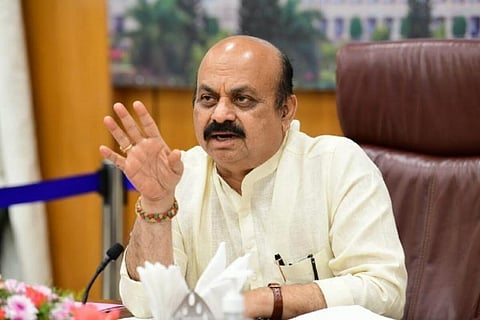

In one of Bommai cabinet’s last decisions before the Karnataka Elections this year, the government has decided to remove Muslims from the OBC category under the state’s reservation matrix and accommodate them under the Economically Weaker Section (EWS). Muslims were previously under the 2B group of Other Backward Classes (OBC) in the state, which provided for a 4% quota.
With the BJP government’s latest decision made on Friday, March 25, this 4% will now be distributed among the newly-created groups 2C and 2D, under which the politically prominent Vokkaligas and Lingayats fall respectively. With this, the quota for Vokkaligas has been increased to 6% from 4%, and to 7% from 5% for Lingayats. This was the Bommai government’s last cabinet before the elections, as the model code of conduct may come into place at any time and suspend activity.
Addressing the media after the cabinet meeting, Chief Minister Basavaraj Bommai said that most of the Muslims come under the 2B category (a minor percentage are accommodated in 2A category) and they would be accommodated in the EWS category. “Even in the 2B category, there is an economic criteria like income and land to get reservation. We are just shifting them to the EWS category, where they will have a bigger pool," he said. Bommai also said that there was no provision for reservation for religious minorities and it has been struck down by the court even in Andhra Pradesh. “In case, there is a challenge tomorrow on the same thing here, we do not want to strike it down. So we are moving them to EWS, where the economic criteria requirement will not change. We have not disturbed that,” he maintained. With the removal of Muslims from the 2B category and the quota of 4% of that category moved to 2C and 2D, the 2B category will be left with no reservation, but it will not be removed from the OBC list, Bommai said.
In addition, the cabinet also decided to accept the recommendations on internal reservations for Scheduled Caste, made by the cabinet sub-committee, which had studied the AJ Sadashiva Commission report on the same. “There has been a long standing demand for internal reservation. Everyone should get justice in accordance with their population and status. Hence, the cabinet decided to approve the recommendations of the committee,” he said. Accordingly, there will be four groups in SC which will be classified as SC Left with 6% reservation, SC Right (5.5%), Touchables (4.5%) and Others with 1% reservation. The Touchables consist of Banjara, Bhovi, Koracha and Korama communities. Bommai said they would be sending the recommendation to the Union government shortly.
The cabinet also approved the demand of Kadu Kurubas, Jenu Kurubas and Gond Kurubas demand to be included in the Scheduled Tribe reservation list. “We had asked for an anthropological study on these communities from Mysore university and we have received the report. We already have the report about these communities from four districts. We have asked other districts to also submit a report. Once it comes in, we have asked the concerned department to evaluate it and send a recommendation to the Union government,” he added.
The cabinet has also decided to accommodate the wishes of communities like Pinjar, Chappar Band and Daroji communities to establish a corporation.
As the state government witnessed intense pressure from various caste groups for increased OBC reservation, in December 2022, it created two new caste categories for the Lingayats and Vokkaligas. The two were shifted out of the 2A and 2B categories to new ones called 2C and 2D. At the time, Law and Parliamentary Affairs Minister JC Madhuswamy had said that they would determine the percentage to be allocated for the Economically Weaker Section (EWS) quota (10% reservation) based on their population and then allot the remaining percentage to the newly added categories.
On January 12, 2023, the Karnataka High Court stayed the government’s decision and directed it to maintain status quo in reservation quotas. However, on March 23, a division bench of the High Court vacated the status quo order when it allowed the government to bring the Panchamasali Lingayats under the 2A category. The quantum of reservation under this category is 15%. The Panchamasalis are a sub-sect of Lingayats who have been heavily protesting to be classified under a category separate from the other ‘dominant’ Lingayats.